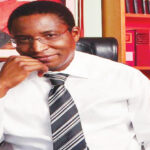
Experts have urged stakeholders in the health sector and patients to embrace the recently launched artificial intelligence invention – Chat GPT, noting that it is poised to radically change healthcare delivery.
Chat GPT owned and developed by Artificial Intelligence research company, OpenAI, was launched as a prototype on November 30, 2022. It is an intelligent chatbot that helps automate chat tasks.
While Chat GPT’s factual accuracy, however, has been questioned, it has continued to attract interest because of its detailed answers across many sectors of knowledge.
The health experts stated that the wind of change from artificial intelligence blowing across different sectors will also impact the health sector, urging stakeholders in the sector to begin to embrace the reality.
The experts stressed that Chat GPT will provide adjunct and complementary services in the healthcare sector.
While acknowledging the possibility of job losses in the healthcare sector as the influence of artificial intelligence like the Chat GPT grows, the experts said that physicians will continue to play an important role in healthcare, noting that they cannot be replaced by AI.
Speaking with PUNCH HealthWise, the experts, Assistant Professor of Medicine at the University of Texas, Dr. Oyetokunbo Ibidapo-Obe, and CEO and Co-Founder, Medispark, Ugochukwu Nwokoro acknowledged the incursion of artificial intelligence into the medical space and called for greater technical know-how on the part of the health regulatory authorities to effectively deal with the reality.
Speaking with our correspondent, Dr. Ibidapo-Obe said that Chat GPT helps enhance a lot of the processes in the health sector, adding that it can even help get a simple diagnosis done and minimise delays.
She said, “The areas that can be transformed by ChatGPT are basically all areas. Things as ordinary and mundane as scheduling appointments, processing test results & conveying the same in easily understandable non-medical terminologies. It does not replace the physician/medical practitioner. It is an adjunct to the attention/service of a healthcare professional since several things can go wrong if the system is misunderstood.
“AI can help to reduce the workload due to easy access to information since a lot of work is self-directed at the moment. For example, there’s no need for a real human cadaver as this can now be done on a 3d platform, but it also poses a challenge because it’s quite different from the real thing.”
On how the health regulatory environment should relate to Chat GPT and other AI tools, Dr. Ibidapo-Obe said while health regulatory authorities should be excited about the potential benefits of the invention, they should come up with guidelines to ensure no harm is done by it.
“The first reaction should be that of excitement as to the possibilities of the AI tool. It cannot replace the role of healthcare professionals but parameters should be set on how to use it or what it can do. Just as a knife can help a child cut his food, it can also cut the child’s hand. Regulatory bodies need to enhance the safety of its use to help the general public apply caution,” she said.
The physician dispelled the notion that there will be massive job losses in the health sector with the growing influence of artificial intelligence tools like Chat GPT but acknowledged that the invention will cause some changes to the way the sector operates.
• To continue reading this story, go to: https://healthwise.punchng.com





